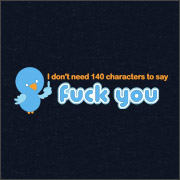This from Marketing Charts: Half of Twitter Has Never Tweeted.
So… 60% of people on Twitter abandon it after the first month.
And now we find that half of the people on Twitter have never tweeted. Furthermore,
80% of users failed to provide a homepage URL
76% have not entered a bio in their profile (vs. 20% last year)
69% have not specified a location
And we know that Twitter is for old people – people under 24 are not on Twitter.

We have seen media events broken via Twitter – or is it that the media focussed on Twitter as an additional story hook? Is it that Twitter’s limited 140 character capacity is forcing participants to provide brief and rapid updates – rather than longer, less frequent updates? Which is better?
So – what’s the future of Twitter? Is it a tool for media people to keep in touch with each other? Is it for self-promoters? Or will it evolve to become something largely useful, rather than just a handful of interesting things between tweets about outrage / quality sandwiches / coffees / weather?



Ranters,
Google’s model of funding online freeware by paid advertising may have run its course.
Scores of upstarts emulating this revenue model may simply be stretching your finite user time. Users re-allocating their application use time results in over-engineered and labour-intensive applications that lose funding once registered users lose interest.
I picture the future of Twitter as a commercial online service rather than the social medium it has become. The application is only really useful to people who need to interact at any and all times online. Although the technology is readily available it is my opinion there are very few who live constantly in the online environment and depend on live feeds to carry out their work or lives.
Twitter needs to create commercial products.
Twitter can build and sell communications packages. These packages would be sold to companies who need to communicate with their staff and tie in other services by subscription.
The Twitter of today is fighting the other social networking behemoths on their terms. Their content is not low tech 140 character text. Twitter needs to take this apparent strength of transmitting 140 character text and adapt it into a commercial application. Can they build a faster, cheaper taxi booking service? Can this booking service be run be less hands currently needed? Can the service feedback to the company?
A major step in the development of Twitter as a commercial tool would be the acquisition of internet bandwidth. Customers would want their Twitter enabled devices to use cheap, purpose supplied bandwidth. Bandwidth that enables video streaming is a waste to a device needing to transmit and receive a short electronic signal.
Cheap will always clinch it for companies. Dot matrix printers are a testament to this because of their longevity, cheap operating cost and reliability. There are still plenty around because they get the job done.
Do it cheap, do it Tweet!
Twitter
@Paul, Twitter is doing fine. If people don’t like it then, don’t use it. As a user of Twitter, I find myself communicating with the young and old, its helped me build long distance relationships and opened the door to people in offices next door. Its present huge opportunities for our business and we passed opportunities to others.
What defines the group using Twitter is an openness to change & invest time into exploring new media.
What marketers are forgetting is that Social Networking is all about conversation, community and collaboration…
Nice post mate!
From a PR perspective Twitter provides us with a window to engage people on a personal level, monitor conversation and discuss topical issues in a conversational tone – unlike email. However, arguing the merits of the rtms for personal use is a little trickier.
Tweet deck is always open at my desk. It allows me to monitor news, campaigns etc from Acti abroad, competitive gaming publishers and a few select sources of s/m content (@servantofchaos; @scott_drummond; @jyesmith to name but a few). Using Twitter in this fashion has facilitated my growth as a comms professional and I’m always finding useful and relevant information to send through to the brand team. Would I wither and die without it? Probably not, but as a resource it certainly has its place as and helps me be a better practitioner.
That said, Twitter is very much an open platform that gives carte blanche to users, and because of this, debate is always generated by the question hanging over Twitter’s “egotistical”, “narcissistic” connotations. My opinion, why not entertain through writing – that is what traditional authors do? Toby Young is a massive Twit (erm) and I feel closer to his work because of his online openness. I understand and appreciate these alternative views but I also find it strangely enjoyable to post those little 140 character sentences.
Well, that’s my two cents any who